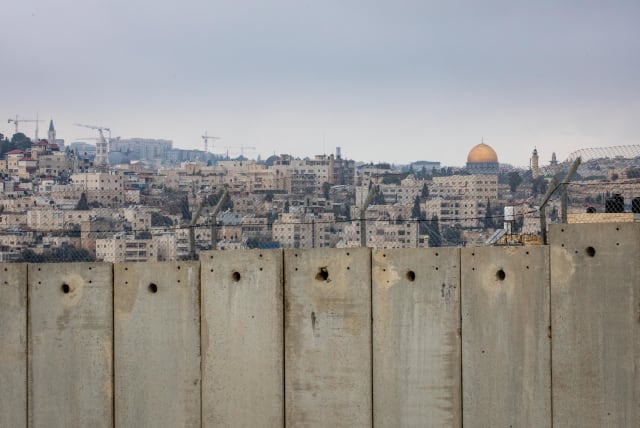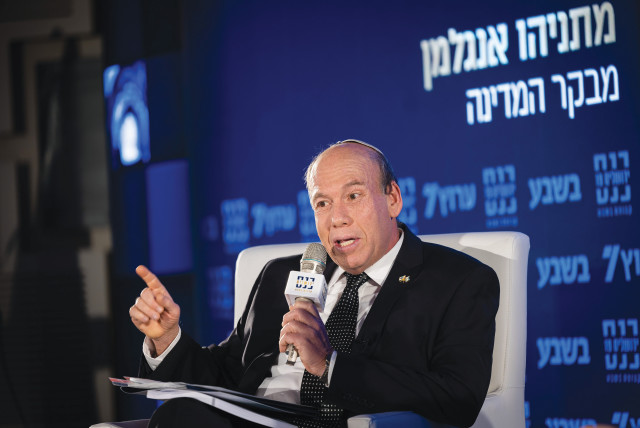Israel's comptroller finds security gaps in wake of October 7 massacre

State Comptroller Mananyahu Engleman tours border fences in the north, south, and in the Jerusalem area, highlighting gaps in the security barrier, and in the nation's security.
After touring along the southern and northern borders, State Comptroller Matanyahu Engelman visited the security fence in Jerusalem, the Sharon region, and Samaria, in the West Bank.
Engleman stated, "The massacre in the Gaza border area should never happen in Jerusalem and Gush Dan. It is the government and the army's responsibility to thoroughly examine the effectiveness of the security barrier."
The State Comptroller emphasized that he would present security authorities with the weaknesses in the border that require urgent refortification, following extensive surveys since the outbreak of Operation Swords of Iron on the southern and northern borders and in bordering communities.
He met with authorities and evacuees throughout the country.
During the tour, the comptroller examined the preparedness of the IDF and the police to provide the necessary security for the residents of the Jerusalem area, and Samaria against infiltrations by terrorists.
Since October 7, Israelis feel insecure and unsafe
Less than a year ago, a comptroller's report was published on the effectiveness of the separation barrier. According to the report, by the end of 2021, 48% of the barrier was not functional. In the same year, over 1.4 million illegal entries into Israel were identified, with less than 1% receiving a response from security forces.
Additionally, in 2022, an average of 3,600 Palestinians infiltrated Israel daily through breaches in the barrier, despite the state investing 8.3 billion shekels by the end of 2021 for the construction of the barrier and other security components.
During the tour, the comptroller met with municipality leaders from Jerusalem, the southern Sharon region, and the head of the Samaria Regional Council, Yossi Dagan. He also participated in the tour with senior police officials and members of emergency teams.
The tour included discussions with residents highlighting gaps and deficiencies in security preparations to prevent terrorist infiltrations into settlements and towns near Palestinian populations.
At the barrier in Jerusalem, the visitors examined the security response, and the disparities in security components in the area between Arab neighborhoods and those beyond the barrier, considered a municipal area of the city, such as the Shoafat refugee camp, and the adjacent Pisgat Ze'ev neighborhood.
In the Sharon, the inspector examined the security situation in settlements adjacent to the fence, such as Matan, and examined how the security forces ensure that the settlements will not experience an attack similar to those in the Gaza Strip.
In Samaria, the inspector emphasized the IDF's actions to maintain the safety of the residents of Yosh and visited Barkan with the head of the council Yossi Dagan.
This is against the backdrop of the audit report on "Security in the West Bank", the draft of which was recently distributed to senior political and military officials for their response, and against the background of a surprise audit of IDF posts on the northern border before the war, the publication of which was suspended at the time by the State Audit Affairs Committee.
The State Comptroller, Engelman, stated, "The massacre on October 7 profoundly affected the perception of Israel’s security for all Israeli citizens. In addition to the communities around Gaza in the south and those along the Lebanon border lines in the north, communities around Jerusalem, Gush Dan, and Samaria are also at risk.
We cannot afford to be complacent. I am currently on a visit near Jerusalem, next to the Shuafat refugee camp. Significant security gaps and gaps in the security needs of the forces operating in the area have been presented to us.
The government and security forces must ensure the full functionality of the separation barrier and examine its effectiveness. I met many residents who did not feel secure and feared for their lives.
The prime minister, defense minister, IDF chief of staff, and Israel Police commissioner must ensure the security of all Israeli citizens, alongside the important activity taking place on the country's southern and northern borders."
Jerusalem Post Store
`; document.getElementById("linkPremium").innerHTML = cont; var divWithLink = document.getElementById("premium-link"); if (divWithLink !== null && divWithLink !== 'undefined') { divWithLink.style.border = "solid 1px #cb0f3e"; divWithLink.style.textAlign = "center"; divWithLink.style.marginBottom = "15px"; divWithLink.style.marginTop = "15px"; divWithLink.style.width = "100%"; divWithLink.style.backgroundColor = "#122952"; divWithLink.style.color = "#ffffff"; divWithLink.style.lineHeight = "1.5"; } } (function (v, i) { });

